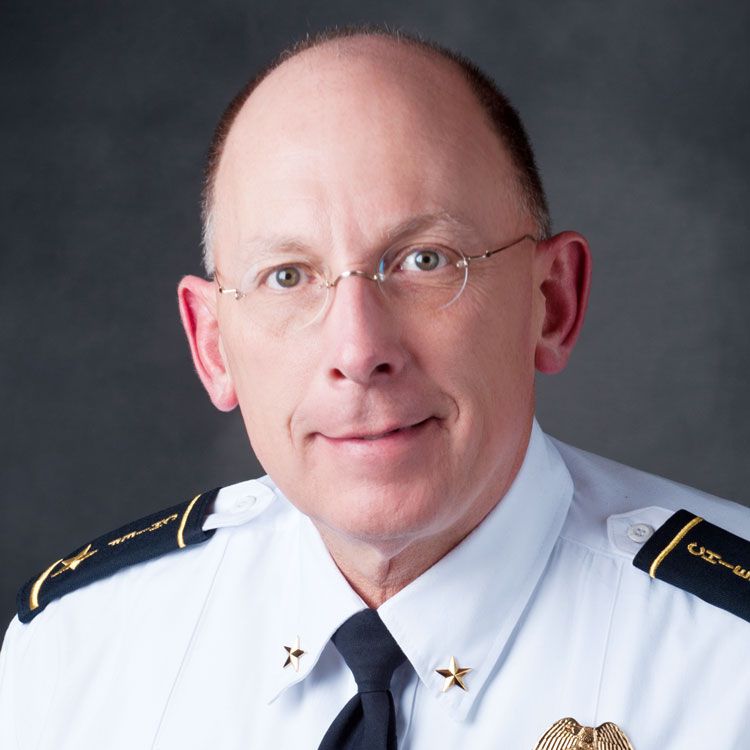- Home
- About Us
- Resources
- Training
- 2024 ETI & Expo
- Partners
- Legislation
- Login
The Worst Job I’ve Ever Loved: leading in a powerful culture
As I approach the end of my career in policing, I can honestly say that serving as a police chief has been the worst job I’ve ever loved. In this essay, I will conduct an analysis of how well I navigated leading within the prevailing police culture. By culture I mean, “the set of shared attitudes, values, goals and practices that characterizes an institution or organization” (Merriam-Webster, 2017). Though police work encompasses a broad range of duties and functions that in part define police culture, it is my proposition that police culture is unique. It is not my attempt to lay blame on police culture for the challenges that are being faced by the profession. After all, culture is often influenced by the political and social dynamics that exist at any given time. There is little doubt that broad geopolitical events, including protests and riots, have affected policing in the United States, including Minnesota. High-profile police shootings and other use of force incidents have drawn the attention of a broad cross-section of the people, especially communities of color. The attention cast upon law enforcement has been remarkable and the demand for police reform is notable. Add the spike in the police officer assassinations and accusations of wholesale racism, and it is easy to see why reform efforts are resisted. When these conditions exist, it is a natural response for police leaders to minimize exposure and give voice to controversial issues. As a result, many law enforcement officers, especially operational or patrol-based police officers, can feel as though they are under attack by loud vocal segments of the community and are at the same time abandoned by police executives and elected leaders when vocal and positive support for law enforcement is not voiced. At the same time the pressures grows, police leadership, especially police chiefs, are called upon to enact transparency or reform efforts. Over the past year or two, few police chiefs have avoided being called upon by their communities, or their elected or appointed leaders to provide explanations about the realities of local policing and police practices. As police chiefs implement reform efforts, such as policy reviews, community dialogues, and other attempts at deepened engagement and transparency, line-level staff can feel they are the explicit focus of these efforts. Simply put, police reform measures can be regarded as or come into direct conflict with the more traditional police culture. Culture reflects paradigm Abraham Maslow’s (1962, p. 15)1 famous quote, “If all you have is a hammer, everything looks like a nail,” reflects the powerful role of paradigms as the lens through which we understand and interact with the world around us. Several years ago, futurist Joel Barker spoke at the Minnesota Chiefs Annual Executive Training Institute (ETI). Mr. Barker explained the work of Thomas Kuhn and Kuhn’s paradigm theory. Kuhn (1962) 2 said a paradigm is a model that describes commonly accepted viewpoints and rules about a subject and how that subject should be understood. During Mr. Barker’s ETI presentation he suggested that one way of seeing the future is to pay attention to what’s happening at the edges of a given paradigm. Barker calls early adopters of a new paradigm “paradigm pioneers.” Though being on the “cutting edge” of a paradigm might seem pioneering or exciting, Barker describes it as a risky place to be. You see, so-called “paradigm pioneers” must adopt the new paradigm without evidence that the new paradigm will in fact be adopted. It seems to me that many of the police reform efforts being suggested demand that police leaders move toward the edges of the prevailing or traditional paradigm of policing. Current police culture or paradigm is a combination of the historical views of policing combined with the influences of social and political realities. There is little doubt that policing faces many challenges. Despite the overwhelming support which nearly all law enforcement agencies experienced after the Dallas sniper attacks and the generally positive regard for police reflected in national surveys, narratives of the police culture suggest that officers are regarded with contempt and should be distrusted. There is no doubt that policing has vocal critics, resulting in the media and large social advocacy groups (i.e. Black Lives Matter, NAACP or ACLU), becoming the focus of considerable distrust and anger from prevailing police culture. The Pew Research Center (2017)3 published survey data intended to give a sense of what police think about a range of issues. I suggest that the prevailing police paradigm might be reflected in these data. Pew Research found that more than two-thirds of officers believe that the deaths of blacks during police encounters in recent years are isolated incidents rather than signs of a broader problem between blacks and the police. Further, 85% of public survey respondents say they understand the risks and challenges that police face, while police say just 14 percent of the public understands the true reality of their jobs. The gap in perceptions is stark. Leading a powerful culture As I now stare down the final months of my career in policing and reflect upon my effectiveness as a police chief, I’ve left much unfinished business. Operating toward or near the edge of the prevailing police paradigm reflects what I’ve always viewed as part of my role as a police leader. Sometimes this put me at odds with large segments of my own department. As I leave police leadership, I feel bad about the frustration I’ve caused to the officers, sergeants, and command staff with who whom I’ve worked. No chief seeks to leave their career as an outsider to the very culture all police grow up in. I’ve always believed that if leaders want to influence and change the negative aspects of police culture, they must keep one foot outside the culture and one foot inside the culture. This is no easy task, because once the leader is deemed as “outside” the police culture, effectively leading is a major challenge. I stand in deep admiration of the police chiefs who outwardly challenge head on the negative elements of the police culture, which keeps us disconnected from the communities we serve. I admire the chiefs who also fully and respectfully engage with the community – especially community members who challenge and question the practices and very legitimacy of our work. And, I admire the police chiefs who can accomplish the above challenges and still maintain deep and meaningful connections with the police officers they lead. I know that I didn't balance these objectives particularly well. Those chiefs who are successful at balancing these objectives might be the “paradigm pioneers” Mr. Barker described to us at ETI years ago. During my career, I’ve seen first-hand the harshness of police culture, which separates us from those we serve, stifles creativity, and creates intolerance of the full range of difference within our own ranks. I’ve also witnessed the best elements of police culture when another officer or some agency calls for help – you can be assured help is coming. Leaving police leadership with some regret over my leadership failings and pride in my successes, I can truly say being a police chief is best and worst job I’ve ever loved. Maslow, A. H. (1970). The Psychology of Science, a reconnaissance. Chicago, IL: Gateway Publishers. Kuhn, T. S. (1962). The structure of scientific revolutions. Chicago, IL: The University of Chicago Press. Wormald, B. (2017, January 06). Do you know what police think? Retrieved April 1, 2017, from http://www.pewsocialtrends.org/interactives/what-do-police-think/ |

 By Chief Paul Schnell, Maplewood Police Department, (retired as of 6/2017)
By Chief Paul Schnell, Maplewood Police Department, (retired as of 6/2017)